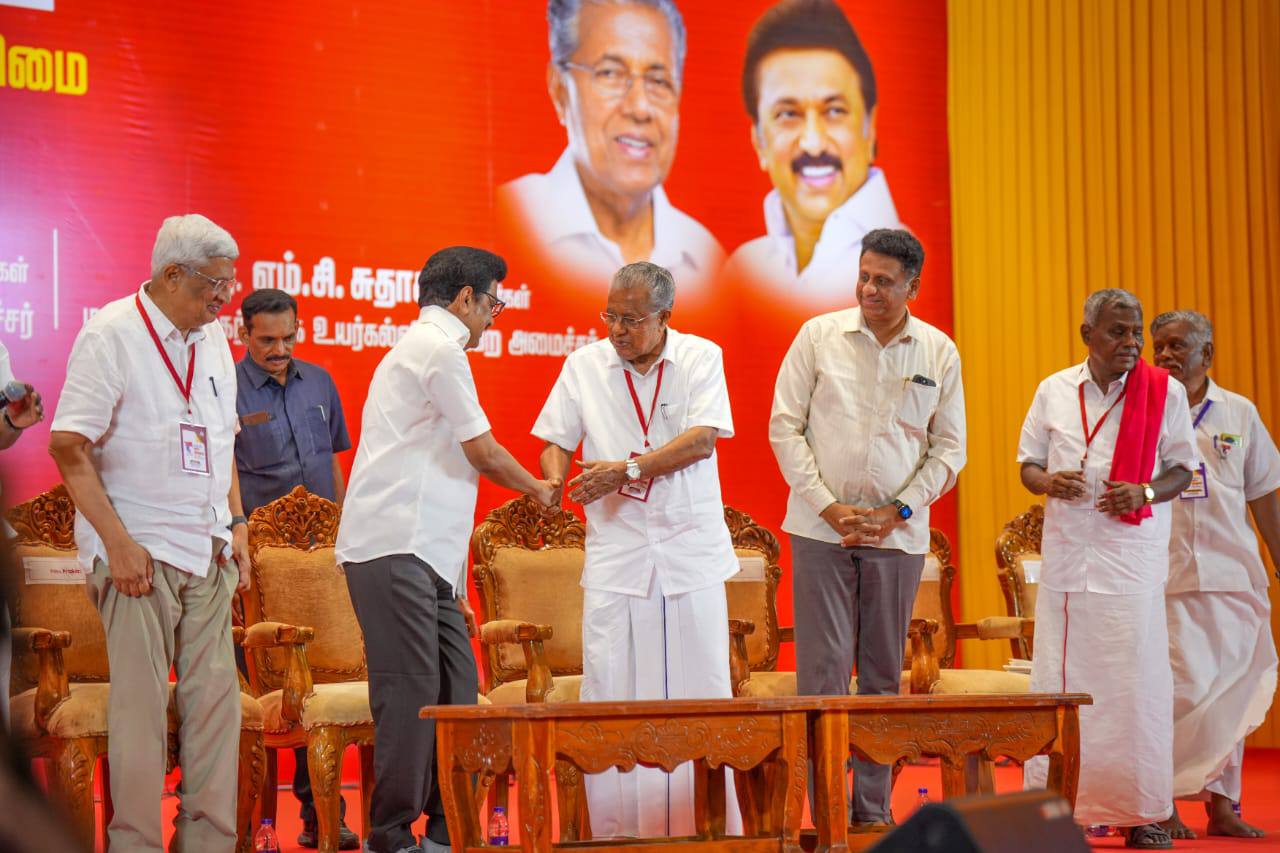
Neelambaran A
Non-BJP governments, including those of Tamil Nadu and Kerala, have been waging continuous struggles – both legal and political – against the discriminatory attitude of the BJP-led central government since 2014
THE seminar on "Attacks on Federalism" at the 24th Party Congress of the Communist Party of India (Marxist) (CPI(M)) featured sharp criticism of the Bharatiya Janata Party (BJP)-led central government for pursuing policies that undermine federal principles and democratic norms.
Since coming to power in 2014, the BJP government has weakened centre-state relations across political, fiscal, and economic dimensions. Opposition-ruled states have faced discriminatory treatment—even during natural disasters—hindering recovery and rehabilitation efforts. The reduction in states' share of central funds has significantly curtailed their capacity to implement social welfare programmes and develop infrastructure.
Prakash Karat, Coordinator of the CPI(M) Polit Bureau, along with Kerala Chief Minister Pinarayi Vijayan, Tamil Nadu Chief Minister M K Stalin, and Karnataka's Higher Education Minister M C Sudhakar, strongly criticised the BJP government for repeated transgressions against states' rights. They specifically condemned the centre for withholding revenue due to the states, using governors as obstructions to development initiatives, and imposing legislation without consulting state governments.
STATE GOVERNMENTS FORCED TO APPROACH COURTS
State governments, including those of Tamil Nadu, Kerala, and Karnataka, have been fighting legal battles against the BJP-led central government to secure their rightful share of revenue and disaster relief funds.
Addressing the seminar, Prakash Karat noted that the Karnataka government had to approach the Supreme Court to obtain drought relief. Tamil Nadu and Kerala, which suffered severe floods and landslides resulting in significant loss of infrastructure and lives, are yet to receive any financial assistance for flood relief work – despite court interventions.
He argued that through such actions, the BJP government is undermining the fundamental principles of federalism and reducing states to subordinate entities, even though India is constitutionally defined as a union of states. In yet another violation of federal principles, governors appointed in opposition-ruled states are actively challenging the authority of democratically elected governments.
Comparing them to viceroys of the British Raj, Karat said that these governors are overriding the decisions and activities of elected legislatures.
The BJP government has been making serious attempts to shift towards a unitary structure by formulating legislation that encroaches upon the rights of the states. The Concurrent List, part of the Seventh Schedule of the Indian Constitution, outlines subjects on which both the central and state governments can legislate. However, the BJP government has been transferring subjects from the State List to the Concurrent List, thereby eroding the legislative autonomy of states.
Coming down heavily on the BJP regime, Kerala Chief Minister Pinarayi Vijayan condemned this incursion into the legislative domain of the states. He accused the central government of bypassing the states while entering into international treaties that have significant implications for them.
He further warned that the creation of a separate Ministry of Cooperation and the renaming of the Ministry of Human Resource Development as the Ministry of Education could have serious consequences and further curtail the rights of state governments.
Although many higher education institutions are established and substantially funded by state governments, the draft University Grants Commission (UGC) regulations effectively strip states of their authority in crucial matters, including the appointment of vice-chancellors.
Representing the Government of Karnataka, Higher Education Minister M C Sudhakar asserted that state governments are demanding their rightful share of revenue—not pleading for mercy from the central government.
He urged states to resist the unilateral functioning of the BJP-led government and called upon all democratic forces to unite in defense of federal principles and the Constitution.
Right-wing thinkers and BJP leaders, including the prime minister, have repeatedly expressed concerns about the so-called "freebie culture"—referring to welfare measures for the poor such as old age pensions, disability pensions, and widow pensions.
However, tax benefits, loan waivers, and subsidies granted to the wealthy and corporate companies are portrayed as economic necessities, justified by the claim that they are "wealth creators." At the same time, the central government selectively enforces borrowing rules: while it does not adhere to established norms for its own borrowing limits, it imposes strict restrictions on state governments – particularly those ruled by non-BJP parties.
In a clear display of double standards, the central government includes borrowings by the Special Purpose Vehicles (SPVs) of state governments in their fiscal deficits, while not including their own SPV borrowings in the central government's fiscal deficit.
Although the BJP failed to secure a simple majority in the 2024 general elections, its efforts to push the country toward a unitary state—by undermining federal principles, pluralism, and cultural diversity—have continued unabated.
Moves such as providing citizenship based on religion, proposals to hold simultaneous elections to state legislatures and Parliament, prioritising Hindi over other official languages, and interference with the right to food are widely seen as steps towards the formation of a Hindu Rashtra.
Tamil Nadu Chief Minister M K Stalin stated that the Dravida Munnetra Kazhagam (DMK) and the CPI(M) stand united in their fight against the fascistic BJP regime, which, he said, is seeking to dismantle the states, erase race and language identities, suppress cultural diversity, and weaken constitutional institutions in order to establish a unitary State under one supreme leader.


